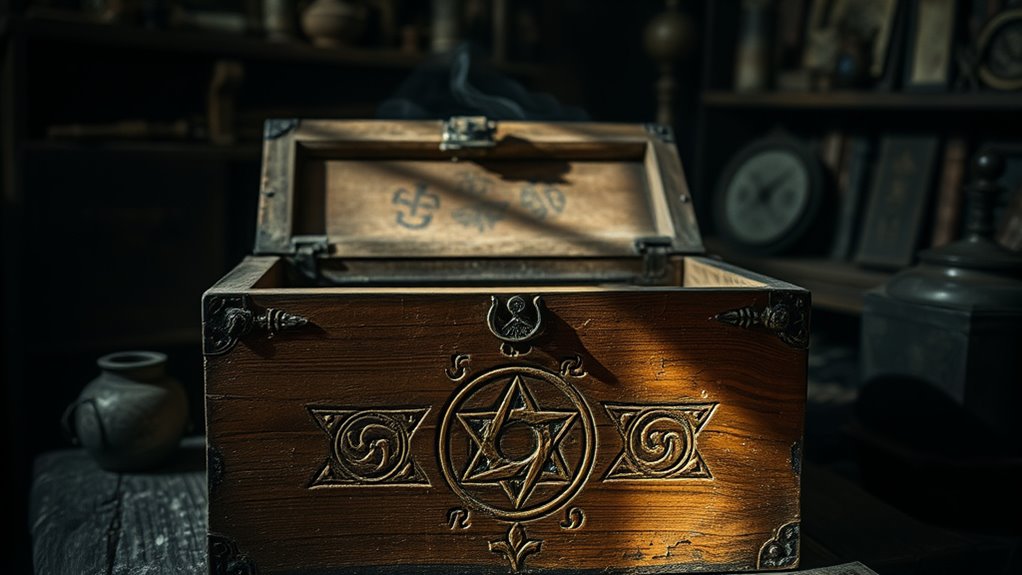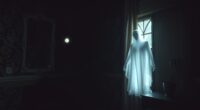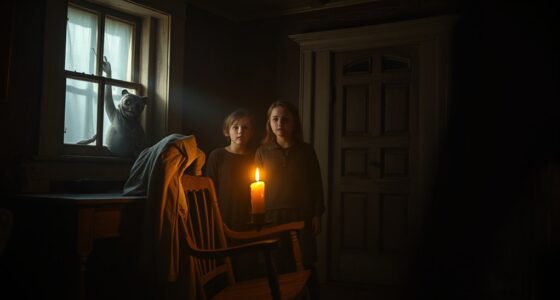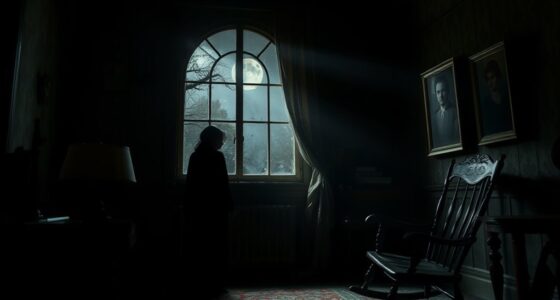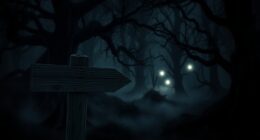The Dybbuk Box intertwines Jewish folklore and modern legends, raising questions about curses versus mere coincidence. Originating from a sensationalized eBay story, many believe this box brings misfortune, linked to reports of nightmares and physical symptoms. However, it’s essential to separate fact from fiction, as its portrayal often misrepresents Jewish culture. This box embodies contemporary fears and superstitions. You’ll discover more about its origins and the fascinating beliefs surrounding it.
Key Takeaways
- The dybbuk box legend originated from a modern narrative, lacking historical basis in traditional Jewish folklore.
- Reports of paranormal experiences often reflect psychological distress rather than actual supernatural occurrences.
- Misinterpretations in media sensationalize the dybbuk box, detaching it from its cultural and historical significance.
- Many experiences attributed to the dybbuk box may stem from a psychological feedback loop of fear and belief.
- The dybbuk box serves as a modern folklore phenomenon, blending myth and reality while engaging public curiosity.
Understanding the Dybbuk in Jewish Folklore
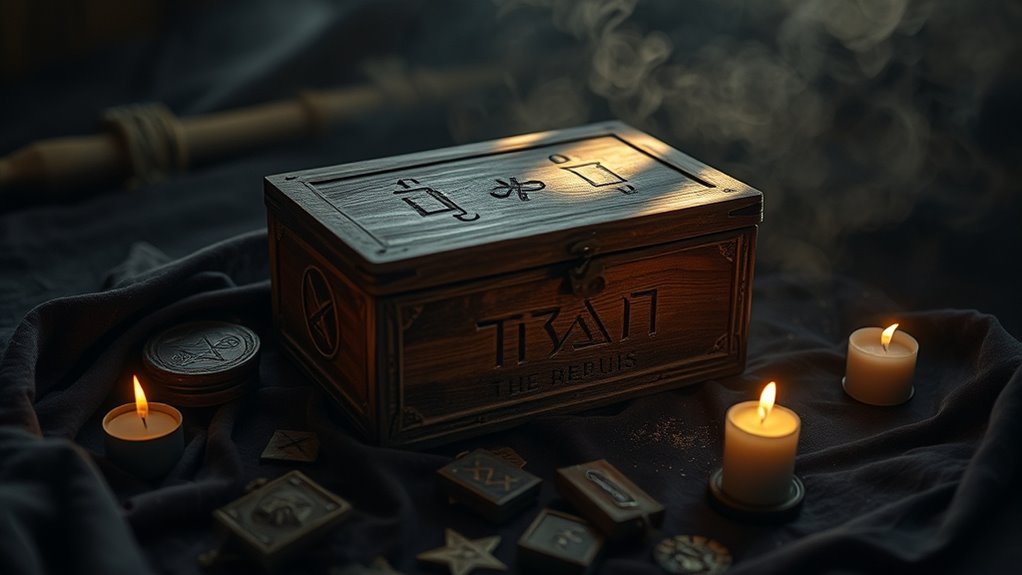
Understanding the dybbuk in Jewish folklore reveals a chilling aspect of cultural beliefs regarding the afterlife and spiritual unrest.
You’ll find that a dybbuk is a restless human spirit, clinging to the living due to unresolved sins. This belief thrived during the 16th and 17th centuries in Eastern European Jewish communities.
The term “dybbuk” comes from Hebrew, meaning “cleaving.” People often associated mental disorders with dybbuk possession, leading to religious exorcisms performed by rabbis.
The term “dybbuk,” meaning “cleaving,” linked mental disorders to possession, prompting rabbis to perform exorcisms.
Isaac Luria’s teachings on soul transmigration fueled this idea, while S. Ansky’s *Der Dybbuk* popularized it beyond its origins.
Ultimately, these beliefs reflect deep fears and the human desire for spiritual resolution, revealing how communities confronted the unknown.
The Origins of the Dybbuk Box Legend
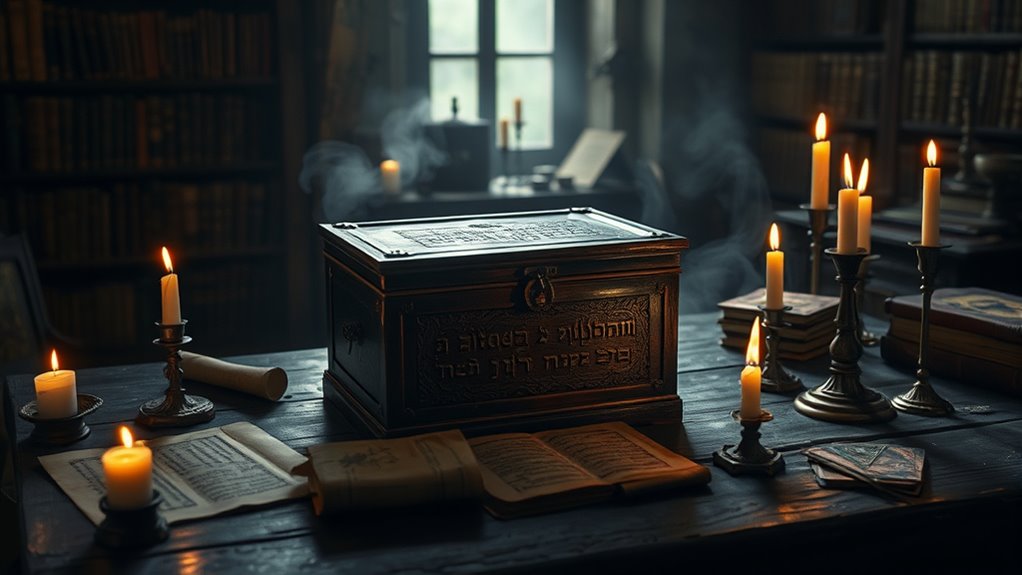
While the legend of the dybbuk box may seem steeped in ancient tradition, it actually emerged from a modern narrative. The dybbuk, a concept from Jewish folklore, refers to a malevolent spirit seeking refuge in a living person. This idea was shaped by mystic Isaac Luria’s disciples, but the dybbuk box itself first appeared in a 2003 eBay post.
As the story spread, it deviated from traditional beliefs, sensationalizing the folklore for commercial gain. Today, numerous “dybbuk boxes” are marketed online, often misrepresenting Jewish culture.
Despite its popularity, there’s no historical basis for these boxes within Jewish tradition, revealing how folklore can be adapted and commercialized for contemporary interests.
Physical Characteristics of the Dybbuk Box
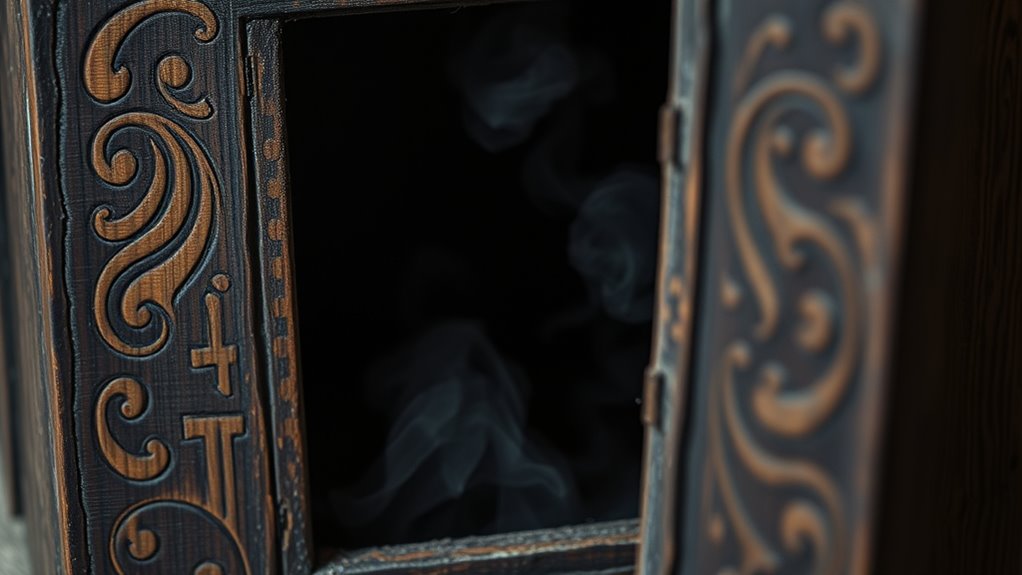
The dybbuk box, often described as an antique wooden cabinet, captivates both collectors and paranormal enthusiasts alike.
The dybbuk box, a captivating antique wooden cabinet, intrigues collectors and paranormal enthusiasts alike.
Typically resembling a small wine cabinet, it’s often said to originate from Eastern Europe, steeped in Jewish folklore. While its age is frequently disputed, the box is generally perceived as old.
You might notice that it features a simple door with a latch, and small compartments for storing items. Adorned with symbols or carvings believed to ward off spirits, it boasts a worn, antique finish.
Surprisingly heavy for its size, it raises questions about its authenticity. Some boxes come with documents signed by rabbis, warning against opening them, while skeptics often challenge their true origins and craftsmanship.
Reported Paranormal Experiences Linked to the Box

As reports of paranormal experiences linked to the Dybbuk Box spread, many people who encountered it claim to have felt an overwhelming sense of dread.
Those who interacted with the box often describe severe nightmares and night terrors that left them shaken. Some report strange physical symptoms, like sudden hair loss and unexplained illnesses, adding to their distress.
Individuals also mention strange odors wafting from the box and sightings of shadowy figures nearby, intensifying their fear.
Many believe the box brings misfortune, leading to psychological effects that include feelings of paralysis and pain.
These chilling accounts have only fueled fascination and fear surrounding the Dybbuk Box, making it a compelling topic in paranormal discussions.
Investigating the Claims: A Skeptical Perspective
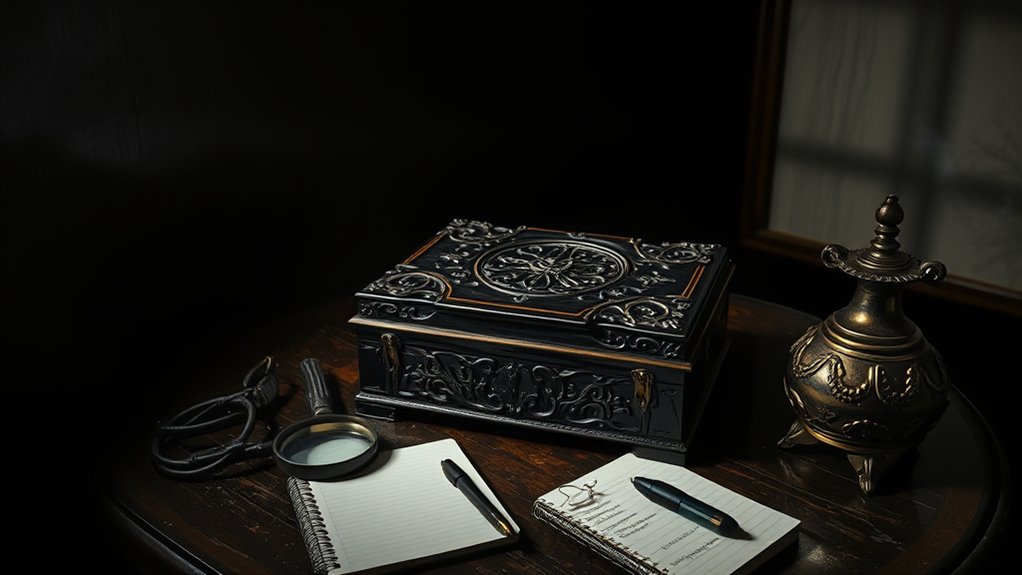
Reports of eerie experiences linked to the Dybbuk Box have sparked intense curiosity, but a closer look reveals a different narrative. The legend began with an eBay listing in 2001, where the story was fabricated to attract paranormal interest.
Skeptics like Brian Dunning and Kenny Biddle have shown that the box is likely just a minibar, not a haunted artifact. The concept of a dybbuk inhabiting an object is nonsensical, as traditional folklore focuses on possession of individuals, not inanimate items.
Biddle’s investigation concluded the story was crafted for profit, highlighting the importance of skepticism. Ultimately, the Dybbuk Box serves as a modern myth, illustrating how fear and storytelling can shape perceptions of reality.
Cultural Impact of the Dybbuk Box in Popular Media
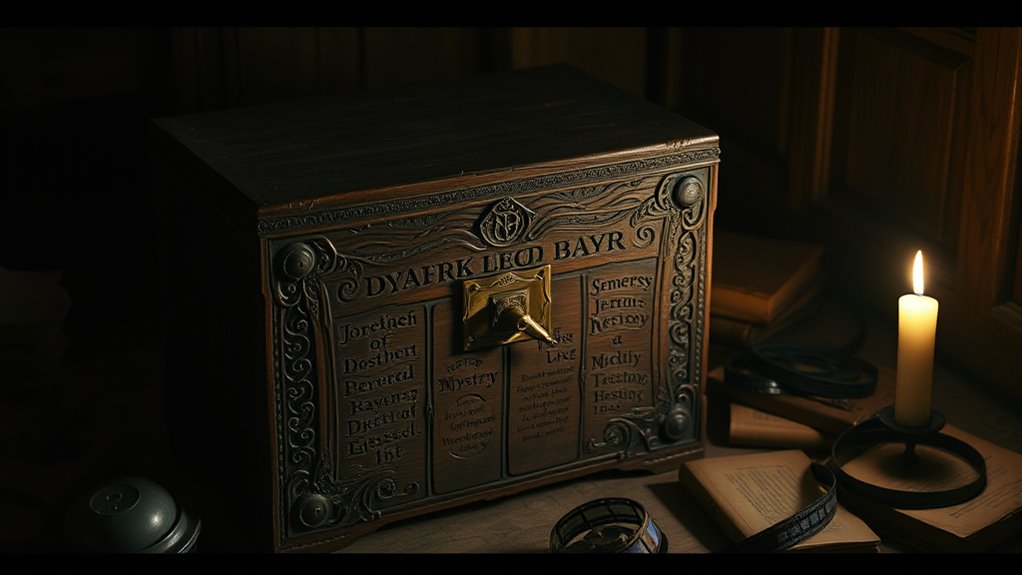
While exploring the cultural impact of the Dybbuk Box in popular media, you’ll find that its portrayal often strays far from its Jewish roots. Films like *The Possession* and shows such as *Ghost Adventures* sensationalize the concept, leading to cultural appropriation and misrepresentation of Jewish folklore.
This misinterpretation not only distorts the true nature of dybbuks but also generates anti-Semitic backlash against those who speak out. Social media platforms amplify this trend, trivializing profound traditions and often spreading misinformation.
The commercialization of dybbuk boxes as novelty items further detaches them from their historical context, creating confusion. Overall, the media’s treatment of the Dybbuk Box influences public perception negatively, overshadowing the genuine significance of Jewish culture.
The Connection Between Mental Health and Dybbuk Beliefs
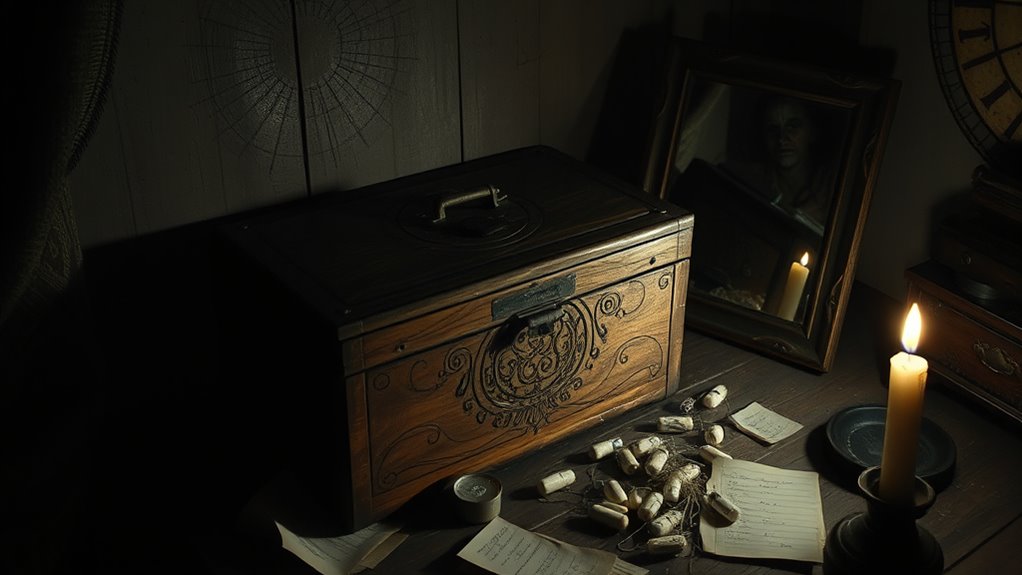
The portrayal of the Dybbuk Box in popular media often oversimplifies complex cultural narratives, leading to misconceptions about dybbuks and their significance.
Dybbuk possession historically symbolizes repressed emotions, particularly among women who faced societal constraints. This phenomenon often manifests as hysteria, mirroring symptoms of modern mental health issues.
While traditional beliefs attributed possession to supernatural causes, contemporary psychology emphasizes psychological explanations for these experiences. The shift from viewing dybbuks as demonic influences to understanding them as reflections of social dynamics aids in reducing stigma.
Rituals and Myths Surrounding Possession
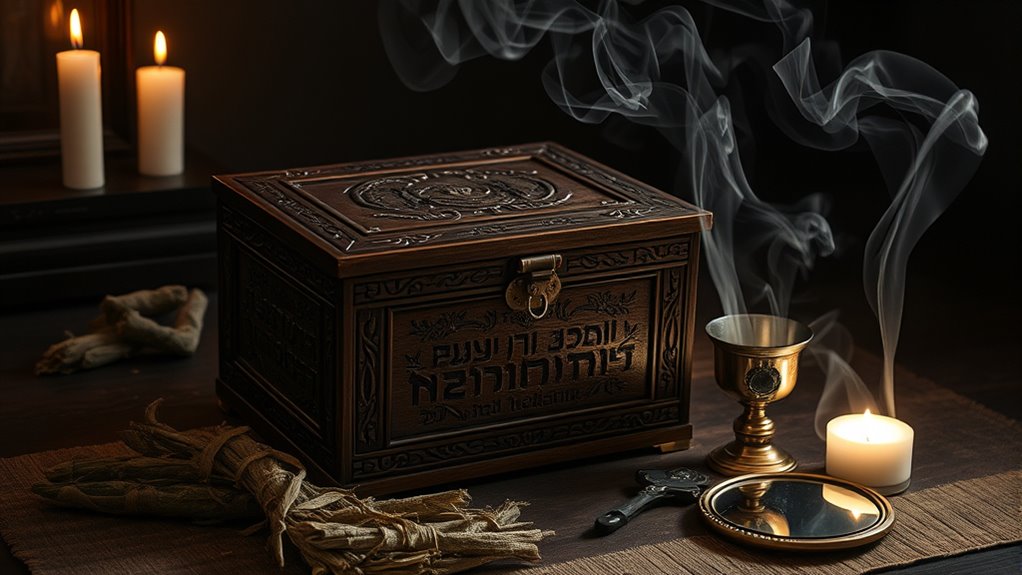
Though dybbuk possession is often shrouded in mystery, the rituals and myths surrounding it reveal a fascinating blend of cultural beliefs and spiritual practices.
Exorcism procedures typically involve opening the Torah ark, lighting candles, and reciting incantations, while the dybbuk is warned not to enter another body. It’s believed the spirit exits through the host’s big toe, minimizing harm.
Both the dybbuk and the possessed person remain conscious, leading to distress during possession.
Originating from Sephardic folklore, dybbuks have evolved in Jewish culture, weaving their way into literature and modern myths like the Dybbuk Box.
This cultural fascination reflects deeper fears surrounding possession and the spiritual conflict embodied in these ancient beliefs.
Debunking the Haunting: Evidence vs. Anecdote
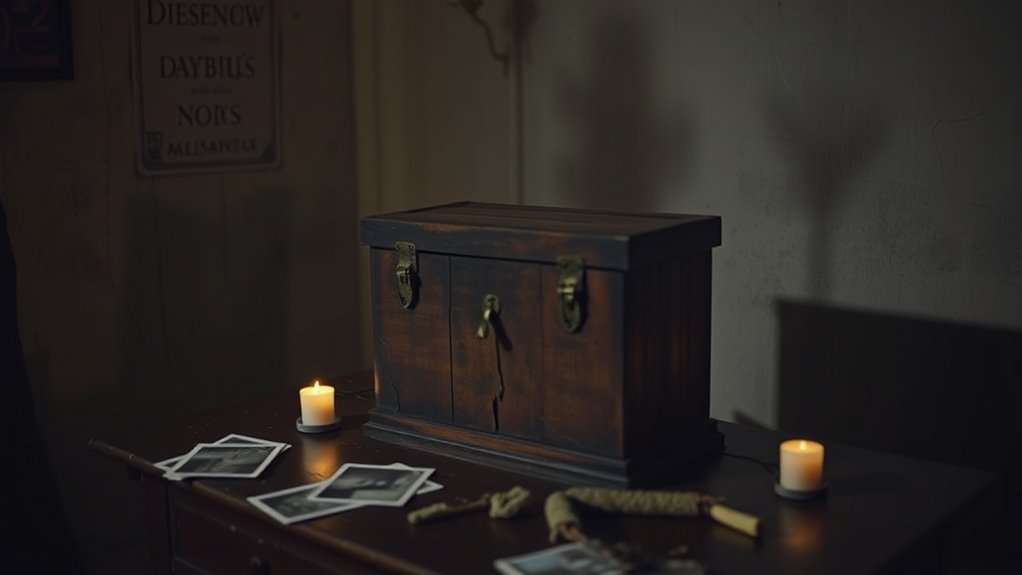
What evidence truly supports the claims of haunting surrounding the Dybbuk box? You’ll find that much of the so-called evidence is anecdotal and lacks scientific backing.
Skeptics like Brian Dunning highlight that the dybbuk myth refers to spirit possession of humans, not objects, making the box’s haunting claims nonsensical. Investigations reveal it’s merely a New York minibar, not a Jewish wine cabinet, contradicting its backstory.
Skeptics argue the dybbuk myth pertains to human possession, not objects, undermining the haunting claims of the Dybbuk box.
Toxicity tests show no harmful materials, and attempts to replicate supernatural experiences fail. Instead, the box’s notoriety largely stems from sensational media coverage and fictional storytelling.
Public misconceptions thrive, but the lack of empirical evidence raises serious doubts about any haunting claims associated with the Dybbuk box.
The Dybbuk Box as a Modern Folklore Phenomenon
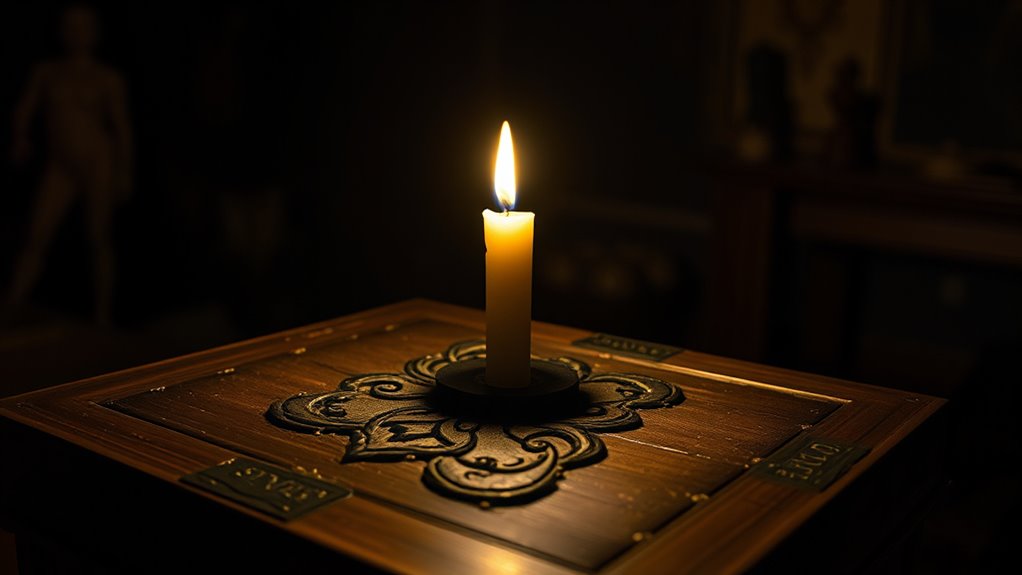
Emerging from a mix of media hype and urban legend, the Dybbuk Box has become a fascinating piece of modern folklore. You’ll find its story woven into popular culture, especially after the 2012 film *The Possession* brought it to the forefront.
With each mention in paranormal TV shows and social media, the legend grows, feeding a psychological feedback loop that amplifies the belief in its supernatural ties.
While rooted in Jewish folklore, the box misrepresents traditional dybbuk concepts by linking spirits to objects instead of people.
This modern adaptation captures deep-seated fears and fascinations, making the Dybbuk Box a compelling cultural icon that reflects society’s ongoing relationship with the supernatural.
Frequently Asked Questions
Can Anyone Become Possessed by a Dybbuk?
Yes, anyone can become possessed by a dybbuk, especially if they’ve a troubled past or are experiencing emotional vulnerability.
Dybbuks are believed to target individuals during significant life events, particularly those with unresolved issues or sins.
You might be more susceptible if you’re facing mental distress or instability.
The folklore suggests that the dybbuk seeks refuge in a living person, making possession a possibility for anyone who fits these criteria.
Are Dybbuks Only Associated With Jewish Folklore?
Like shadows cast by flickering candles, dybbuks dance primarily within Jewish folklore, yet their essence resonates beyond.
You’ll find echoes of similar spirits in various cultures, each with unique interpretations. From the onryo of Japan to other entities worldwide, the concept of malevolent spirits isn’t confined to a single tradition.
While dybbuks are rooted in Jewish mysticism, the idea of restless souls is a universal theme woven through many belief systems.
How Can One Protect Themselves From a Dybbuk?
To protect yourself from a dybbuk, you can start by affixing a mezuzah to your doorpost, as it’s believed to ward off malevolent spirits.
Using incantations and engaging in community rituals can also provide spiritual safeguards.
If you suspect possession, seek a rabbi for an exorcism, which involves reading specific biblical verses and using symbolic items.
Surrounding yourself with protective verses can further enhance your defense against these troublesome spirits.
What Should You Do if You Own a Dybbuk Box?
If you own a dybbuk box, take it seriously.
First, consider safely storing it in a secure, isolated place, preferably underground. You might want to consult with a spiritual leader or expert who understands the cultural significance.
Avoid opening it, as doing so could exacerbate any negative effects. If you experience disturbing occurrences, remove the box from your environment immediately.
Stay informed and cautious about its potential risks to your well-being.
Is There a Specific Ritual to Exorcise a Dybbuk?
In a dimly lit room filled with the scent of burning black candles, you gather with a minyan, your heart racing.
To exorcise a dybbuk, the exorcist begins a ritual steeped in tradition. You listen intently as sacred texts are recited, and the shofar blasts echo through the air.
With each incantation, you feel the tension rise, urging the spirit to depart. Together, you invoke healing, hoping for peace for both the dybbuk and the possessed.
Conclusion
To sum up, the Dybbuk Box captures our imagination, blending folklore and fear. With over 60% of people believing in supernatural occurrences, it’s no wonder the tales surrounding this box have persisted. Whether you see it as cursed or just coincidence, the stories provoke a deep-seated intrigue about the unknown. As you ponder the mysteries of the Dybbuk Box, remember that our fears often shape our beliefs, making the line between reality and myth blur ever further.
